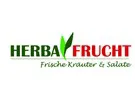For several years, Munich-based company Herbafrucht Ltd, which specializes in herbs, has been working with a wild garlic producer from Hungary and another from Romania. "The season usually starts earlier for both origins than German production," says managing director of Herbafrucht, Phillippe Kahn.
Managing director Phillippe Kahn and general manager Marie Omazic with a crate of wild garlic.
Stable harvest volumes and prices
"We received the first delivery in the first week of March, slowly coming to the end. Demand was very high at the beginning. Thus, customers asked us for the first wild garlic already in January and February. The end of the season should come in the next week or two. During this time, demand also slackens in line with supply," Kahn said. "At the start of the season, the price was quite high, which is why many customers were still hesitant. Compared to last year, the entry price has increased by EUR 1/kg, while the price at the end of the season, however, is EUR 1/kg lower. The latter is related to the higher supply of regional goods," Kahn explains.
According to him, harvest volumes have remained constant in recent years, despite the cost and weather-related circumstances. "Both with the clientele focused on wild garlic and with the suppliers, we have been working together successfully for many years. We don't have to buy in goods from others, nor are there too few goods."
Lots of customers from abroad
However, he said, the wild garlic season virtually failed in the wake of the 2020 lockdowns because only manageable quantities were available. "Also, about 80 percent of our clientele comes from restaurants and 20 percent from grocery stores." Herbafrucht does not deliver its goods, but customers from southern Germany, Austria, Poland and northern Italy will come to the wholesale market daily. "Many customers take long distances because they are convinced by the assortment and quality at the Munich wholesale market."
Furthermore, he said, he notices that the demand for herbs such as Thai basil, Thai coriander and lemongrass is becoming increasingly important. "In the past, these products were more on the sidelines, but now they are selling well. Aside from that, we're also seeing good sales with sugar snap peas, kenya beans and cress, which we source from our herb growers."
Over the course of the season, there are constant fluctuations due to the holidays, he said, with weather still being a determining factor. "If it rains for weeks straight, then overall the whole wholesale market is very quiet. As soon as the weather gets better, you notice that demand increases everywhere. Eventually, restaurateurs can reopen their outdoor areas as their patrons are going out more."
For more information:
Phillippe Kahn
Herbafrucht GmbH
Großmarkt München
Tel.: +49 177 4922432
info@herbafrucht.de
www.instagram.com/herbafrucht
